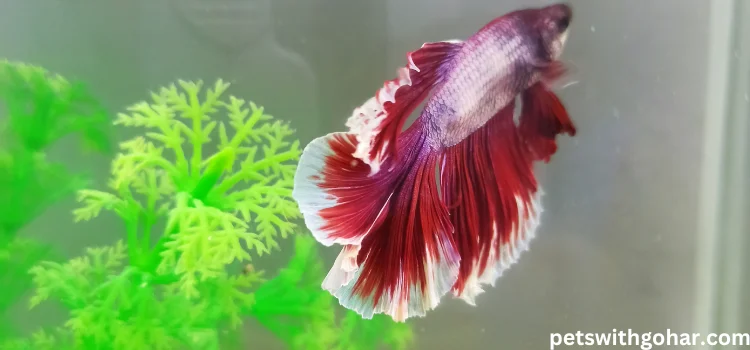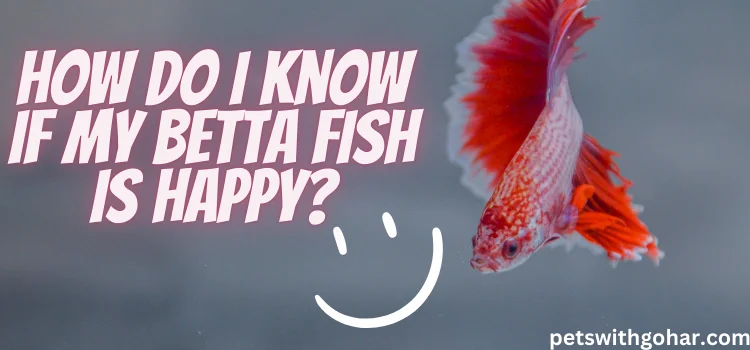Determining if a betta fish is happy involves observing its physical condition and behavior. A content betta fish often displays vibrant colors, eats regularly, and is active in its aquarium.
It also shows curiosity about its environment, flaring its fins occasionally, and doesn’t exhibit signs of stress such as rapid breathing, loss of color, or lethargy. It’s important to note that each betta fish is unique and may display happiness differently.
10 Signs Of A Happy Betta Fish.
1. Vibrant Colors.
One of the most obvious signs of a happy betta fish is its vibrant and bright colors. Betta fish are known for their dazzling array of hues, and a happy and healthy betta will display these colors boldly.
If your betta fish displays radiant blues, reds, purples, or greens, it indicates they are content and well.
This display of vibrant color is a betta’s way of communicating its happiness and health to the world.
If a betta fish is stressed or unwell, its colors may fade or become dull. Monitoring your betta’s coloration regularly is essential, as sudden changes can indicate stress or illness.
Therefore, maintaining vibrant colors in your betta fish indicates happiness and is a key indicator of their overall health.
2. Eating Regularly.
Another tell-tale sign of a content betta is its consistent eating habits. A healthy betta fish should eat two to three pellets or flakes per day, depending on its size.
If you notice your betta skipping meals or only snacking occasionally, it could indicate that it’s not feeling well and may need to visit a veterinarian.
On the other hand, if your betta is eating regularly and has a healthy appetite, it’s likely to be happy and content in its environment.
3. Activity Level.
A happy betta fish often exhibits elevated activity levels, swimming with curiosity and enthusiasm around its tank.

Betta fish may also flare their fins occasionally as a display of contentment. If your betta is swimming in circles, flaring its fins often, or even chasing after its reflection, it’s likely feeling happy and relaxed.
On the other hand, if your betta appears sluggish or inactive most of the time, it could indicate that it is stressed or unwell.
4. Playing With Toys.
If your betta fish loves to play with toys, it could signify that they feel happy and content in their environment.
Betta fish enjoy playing with small plastic ornaments, such as castle-shaped decorations or floating balls.
They may also nip at the toys from time to time, which is an indication that they’re having fun.
If your betta is playing with toys for extended periods, it’s a sure sign they are content and happy with their environment.
5. Active And Energetic.
An active and energetic betta fish is a happy betta fish. The energy levels of these fish are an excellent indication of their physical and emotional health.
When your betta fish feels content, it explores the tank, moves briskly, and shows interest in its environment.
This active behavior can manifest in different ways. You might see your betta swim up and down the tank, darting between plants and probing the nooks and crannies of the tank decor.
They might also show a keen interest in interacting with you, following your fingers as you move them outside the tank or zooming over to greet you when you approach.
However, it’s essential to note that a balance must be observed. While good activity, hyperactivity, or erratic swimming can signify stress or illness.
Healthy, happy betta fish exhibit energy in a controlled, curious manner. It could be a sign of something amiss if your betta is swimming frantically, crashing into tank walls, or darting around without purpose.
6. Healthy Appetite.
A healthy appetite is another primary indicator of a happy betta fish. These colorful, predatory fish are often eager eaters, and observing their feeding habits can provide key insights into their overall well-being.
Typically, a content betta fish will eagerly approach food once introduced into the aquarium, feeding actively and purposefully.
The types of food bettas enjoy range from specially formulated betta pellets to live or freeze-dried brine shrimp and bloodworms.
If your betta fish is happy and healthy, it should have a strong appetite and a keen interest in feeding time.
However, it’s crucial not to overfeed your betta because this can lead to health issues such as bloating and constipation.
In contrast, a lack of appetite or interest in food can signify stress or illness in betta fish. Suppose you notice a sudden change in your betta’s eating habits, such as refusing food or eating significantly less than usual. In that case, it’s a good idea to monitor their behavior closely and consider seeking advice from a fish health professional.
7. Flaring Fins.
Flaring fins is a unique behavior exhibited by betta fish, often a strong indicator of their emotional state. A happy and healthy betta occasionally flares their fins to display strength and confidence.
Bettas have a specialized labyrinth organ that allows them to take oxygen from the air. They take in more air as they flare, causing their fins to expand fully.
This dramatic display is not only a sight to behold, but it also signifies that your betta is engaged and alert.
However, it’s essential to remember that constant flaring could signify stress or agitation. Bettas will also flare their fins when they feel threatened or confronted, such as when they see their reflection or another betta. If your betta flares its fins more than usual or for prolonged periods, it could indicate an unhappy or stressed fish.
Observing your betta’s flaring habits can provide a window into their emotional state, helping you ensure your fish survives and thrives in its environment.
Nonetheless, as with all behaviors, balance is key. Occasional flaring is healthy, but constant flaring may necessitate changing the tank setup or conditions.
8. Curiosity About Its Environment.

A betta fish that is content and happy will exhibit a keen interest in its surroundings. This curiosity is manifested in its exploratory behaviors, such as swimming around the tank, inspecting new objects, or interacting with plants, decorations, and other items within its environment. A happy betta will use its surroundings as a source of stimulation and enrichment.
It is common to see a content betta fish pushing small pebbles or gently nibbling at plant leaves.
Another engagement sign is when your betta attentively follows your finger as you move it outside the tank glass. Such behaviors show that your betta is physically healthy, mentally stimulated, and happy.
However, if your betta shows signs of lethargy, hiding excessively, or not engaging with the environment, it could be a sign of stress, unhappiness, or illness.
It’s also crucial to note if there are sudden changes in behavior, as these could indicate a shift in their emotional state.
Providing a stimuli-rich environment contributes to your betta’s happiness and promotes its natural behaviors.
Live plants, colorful stones, and different terrain levels can keep your betta fish interested and active, contributing to its overall happiness.
9. Body Condition And Coloration.
Another aspect to consider when assessing the happiness of your betta fish is its body condition and coloration.
A healthy, happy betta fish should have vibrant colors and a shiny coat. This is a sign that it’s getting the nutrition it needs and is healthy.
In contrast, a betta fish that is stressed or unhappy may show faded colors, visible signs of disease or injury, or even have its fins clamped close to its body.
Weight loss is another indicator of health problems – a healthy betta fish should have a full, rounded body.
If your betta fish starts to lose weight or shows other signs of physical distress, seeking veterinary advice is essential.
Monitoring your betta fish regularly and understanding its normal behavior and appearance will help you quickly identify any changes.
Any shifts in body condition or coloration should not be taken lightly, as these could be early signs of distress or disease. Remember, a happy betta fish is a healthy one.
10. Absence of Stress Signs.
The absence of stress signs is essential in determining your betta fish’s happiness. Like many other species, Betta fish indicate stress through behavioral and physical changes.
One common sign of stress in betta fish is erratic swimming, characterized by sudden darting movements or swimming in circles.
Another indication is the unusual positioning of their fins. Stressed bettas often clamp their fins close to their body instead of spreading them wide and swimming freely.
Moreover, look for signs of changes in eating habits. A betta fish under stress may lose its appetite, refuse food, or eat less than usual. This could lead to weight loss, another sign of stress.
Physically, betta fish may exhibit faded coloration, dull scales, and even visible sores or white spots on their body when stressed. They may also breathe more quickly or stay near the water’s surface, gasping for air.
The absence of these stress signs generally indicates that your betta fish is content and in good health. However, it’s essential to continuously monitor and understand your betta’s behavior to ensure its well-being because a stress-free betta fish is generally a happy betta fish.
Conclusion.
In conclusion, understanding the signs of a happy betta fish involves recognizing their normal behavior and physical appearance and being perceptive to any changes.
A content, healthy betta fish will display vibrant colors, show an appetite, and swim freely without any signs of stress.
It’s crucial to continuously observe your betta fish and watch for signs of stress or disease. Remember, a stress-free betta fish is usually happy, reflecting the care and attention they receive in their environment.
Frequently Asked Questions.
What is normal betta fish behavior?
Normal behavior for betta fish includes active swimming, showing interest in their environment, and eating regularly. They might be curious about their surroundings, exploring their tank’s decorations, plants, and other elements. Bettas also tend to flare their gills and fins when they feel threatened or during their playful moments.
How do I make my betta fish feel loved?
To make your betta fish feel loved, provide them with a comfortable environment. This includes a spacious tank, clean water, a balanced diet, and regular interaction. Adding plants and hideouts can offer mental stimulation. Furthermore, maintaining a regular feeding schedule and spending time near their tank can create a bond and make them feel secure.
How do I make my betta fish feel loved?
To make your betta fish feel loved, provide them with a comfortable environment. This includes a spacious tank, clean water, a balanced diet, and regular interaction. Adding plants and hideouts can offer mental stimulation. Furthermore, maintaining a regular feeding schedule and spending time near their tank can create a bond and make them feel secure.
Do betta fish get brighter when happy?
Yes, betta fish often display brighter colors when happy and healthy. Stress or illness can cause their colors to fade. Therefore, if your betta’s colors are vibrant, it generally indicates they are content and in good condition.
How do I know if my betta fish is bored?
Betta fish might exhibit boredom if they lack environmental stimulation. These signs can include less activity, loss of color, or even overeating. To combat this, provide them with a stimulating environment, including live plants, caves, or toys. Varying their diet can also help keep things interesting.

